
by Gideon Marcus
Instant Classic
There are few expressions as irritating to me as the oxymoronic "Modern Classic"…but I have to admit that the shoe sometimes fits.

Mario Puzo's third novel, The Godfather, came out last month, and I can't put it down. It's not a small book—some 446 pages—but those pages turn like no one's business. It's the story of Vito Corleone, a Sicilian who arrives in the country around the turn of the Century and slowly, but inexorably, becomes crime boss of Manhattan.
The Mafia has had a particular allure of late. LIFE just had a long bit on the recent death of Vito Genovese and the current scramble to replace him as head of the Genovese family. For those who want a (seemingly accurate) introduction to the underworld of organized crime, The Godfather makes a terrific primer.
Bloody, pornographic, blunt, but also detailed and even, in its own way, scholarly, The Godfather is a book you can't put down.
Which is a problem when you're supposed to get through a stack of science fiction magazines every month. Indeed, how is a somewhat long-in-the-tooth, middle-of-the-road mag like Galaxy, especially this latest issue, supposed to compete?

by Vaughn Bodé
Little Blue Hawk, by Sydney J. Van Scyoc
Imagine an America generations from now, after eugenics has gone awry. After some initial promising results, a significant number of humans became dramatically mutated, with profound physical and mental variations accompanied by even more pronounced neuroses. Over time, these mutants have mingled with baseline humans, spreading their traits.
This is the story of Kert Tahn, a wingless hawk of a man, who bears a weighty set of obsessions and compulsions, as well as a dandy case of synesthesia: to him, words are crystalline, shattering into dust and leaving a pall over everything. An urban "Special Person", plucked as an infant from one of the rural Special Person-only communities, he harbors a strong urge to fly, which is why he takes up a job as a hover-disc pilot, ferrying customers out into the hinterlands now reserved for the genetically modified. "Little Blue Hawk" is a series of encounters with a variety of more-or-less insane individuals, and how each helps him on his road to self-discovery.

by Reese
There are elements I really liked in this story. Though the causes of neuroses are genetic, it is clear Van Scyoc is making a statement—and an aspirational prediction—as to how mental illnesses might be accommodated rather than simply cured…or its sufferers tucked away. All Special Persons have the constitutional right to have their compulsions respected, and they are listed on a prominent medallion each of them wears. Of course, this leads to a mixture of both care by and disdain from the "normal" population.
I also thought that a set of neurotic compulsions actually makes for a dandy thumbnail sketch of an alien race—a set of traits that make no sense but are nevertheless consistent,
The problem with this story is simply that it's kind of dull and doesn't do much. I found myself taking breaks every five pages or so. With the Puzo constantly emanating its bullet-drenched sirensong, it was slow going, indeed.
Two stars.
The Open Secrets, by Larry Eisenberg
A fellow accidentally enters into his timeshare terminal the password for the FBI's internal files. Now that he has access to all the country's secrets, he becomes both extremely powerful…and extremely marked.
Frivolous, but not terrible. Two stars.
Star Dream, by Terry Carr and Alexei Panshin
On the eve of the flight of the first starship Gaea, its builder finds out why he was fired just before its completion. The answer takes some of the sting from being ejected from the vessel's crew.
This old-fashioned tale is rather mawkish and probably would have served better as the backbone of a juvenile novel, but it's not poorly written.
Three stars.
Coloured Element, by William Carlson and Alice Laurance
A new measles vaccine is dumped willy-nilly into the water supply, not for its salutory benefits, but for a side effect—it turns everyone primary colors based on their blood type! Ham-handed social commentary is delivered in this rather slight piece.
Two stars.
Killerbot!, by Dean R. Koontz
The mindless, cybernetic monsters from Euro are on the rampage in Nortamer, and it's up to the local law enforcement to dispatch the latest killer. The new model has got a twist—human cunning. But when the monster is taken down, the revelation is enough to rock society.
What seems like a rather pointless exercise in violent adventure turns out to be (I think) a commentary on the recent rash of gun violence—from the murder of JFK to the Austin tower shootings. It's not a terrific piece, but I appreciate what it's trying to do.
Three stars.
For Your Information: Max Valier and the Rocket-Propelled Airplane, by Willy Ley
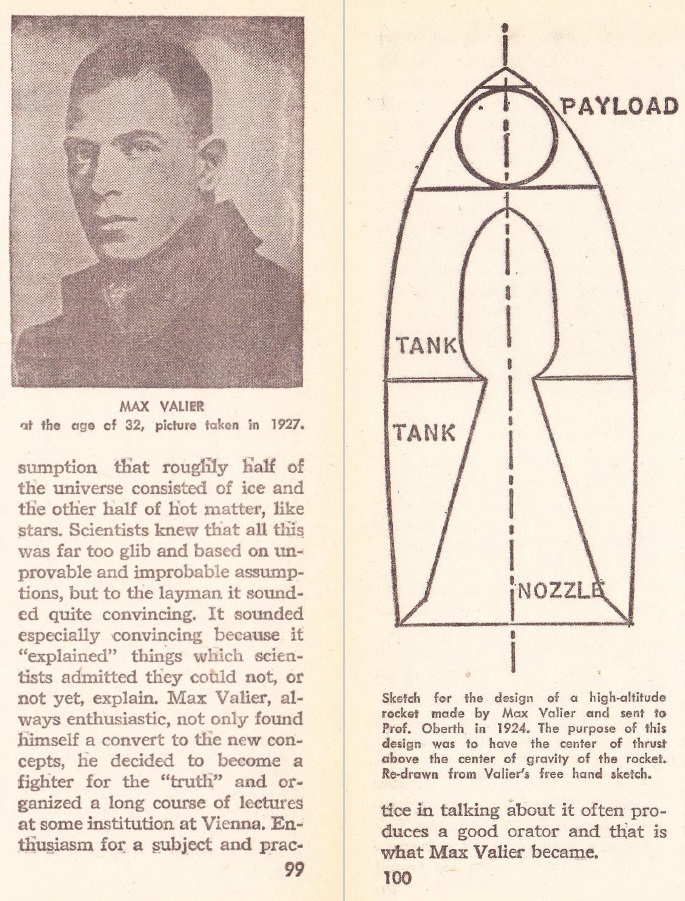
I was just giving a lecture on rocketry pioneers at the local university the other day, and Max Valier was one of the notables I mentioned. Of course, I assumed from the name that he was French. He was not. That fact, and many others, can be found in this fascinating piece by Willy Ley on a man most associated with the rocket car that killed him.
Four stars.
A Man Spekith, by Richard Wilson

by Peñuñuri
The last man on Earth is Edwards James McHenry—better known by his DJ monicker, Jabber McAbber. Well, he's not actually on Earth; right before the calamity that ripped the planet asunder, a Howard Hughes look-alike ensconced him in an orbital trailer with a broadcaster, a thousand gallons of bourbon, and a record collection. Unbenownst to him, Ed also has a mechanical sidekick called Marty, a computer with colloquial intelligence.
Thus, while Ed more-or-less drunkenly transmits an unending, lonely monologue to the universe, Marty provides a broadcast counterpoint, explaining the subtext and background to Ed's plight and thoughts.
It all reads like something Harlan Ellison might have put together, a little less dirtily, perhaps. Hip and readable. Four stars.
The Man Inside, by Bruce McAllister
A henpecked father has gone catatonic with stress, but a new technique may be able to interpret his internal monologue. The result is suitably tragic.
Pretty neat; perhaps the best thing Bruce has turned in so far, but it leaves a bad taste in the mouth. Three stars.
And Now They Wake (Part 3 of 3), by Keith Laumer

by Jack Gaughan
At last, we reach the action-packed conclusion of this three-part serial. All the pieces are in motion: both Loki and 'Thor, immortal soldiers in an ages-long intergalactic war, who have been at each other's throats for 1200 years, are trudging through the rain for the runaway broadcast power facility on the Northeastern American seaboard.
As the Army tries and fails to bring the powerplant under control, the hurricane in the Atlantic intensifies. Meanwhile, we learn what the other unauthorized power-tapper is: none other than Loki's autonomous spaceship, Xix, which is charging its own batteries pending the unhatching of a terrible scheme. The climax of the novel is suitably climactic.
Laumer writes in two modes: satirical and deadly serious. And Now They Wake is firmly in the second camp, grim to the extreme. But it is also very human, very immediate, and, even with the graphic violence depicted, very engrossing. This is the closest I've seen Laumer come to Ted White's style, really engaging the senses such that you inhabit the bodies of the characters, but without an offputting degree of detail (even the gory bits are imaginative and non-repetitive.)
It's not a novel for the ages, and the tie-in to Norse mythology is a bit pat, but this is probably the best Laumer I've ever read, and the one piece that actually made me forget about The Godfather…for a few minutes, anyway.
Four stars.
Back to (un)reality
The first half of this month's Galaxy was certainly a slog, but at least the latter half kept my interest—if only I hadn't started from the end first! That's a bad habit I may have to overcome. I just like seeing the number of pages I have to read dwindle, and that gets easier to mark if you read in reverse order!
Anyway, the bottom line is that Pohl's mag will win no awards on the strength of this month's ish, but Puzo's book may very well. Pick up The Godfather right now…and maybe the Laumer when it's put into book form!

![[April 8, 1969] Distractions (May 1969 <i>Galaxy</i>)](https://galacticjourney.org/wp-content/uploads/2024/04/690408cover-428x372.jpg)


![[December 22, 1968] What wonders await? (January 1969 <i>Fantasy and Science Fiction</i>)](https://galacticjourney.org/wp-content/uploads/2023/12/681222cover-672x372.jpg)

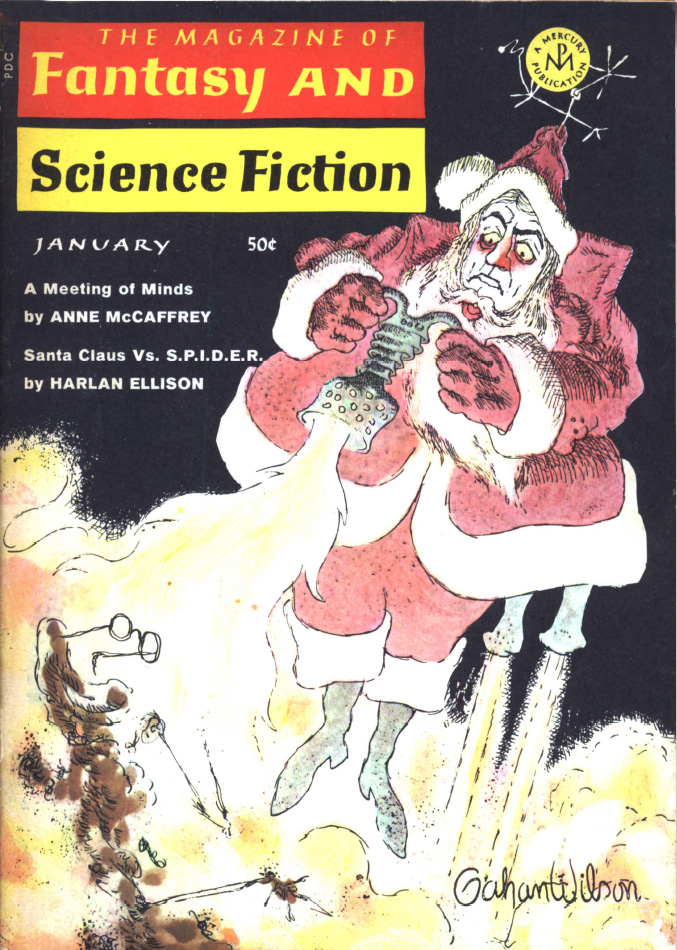

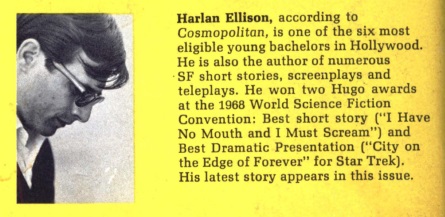
![[September 16, 1968] Siriusly? (October 1968 <i>Galaxy</i>)](https://galacticjourney.org/wp-content/uploads/2023/09/680910cover-672x372.jpg)




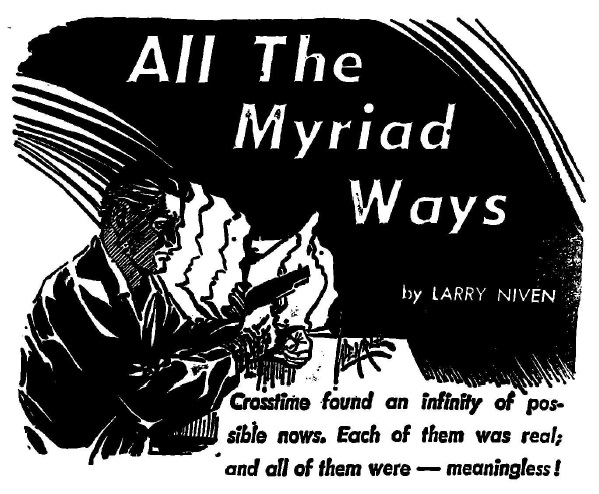




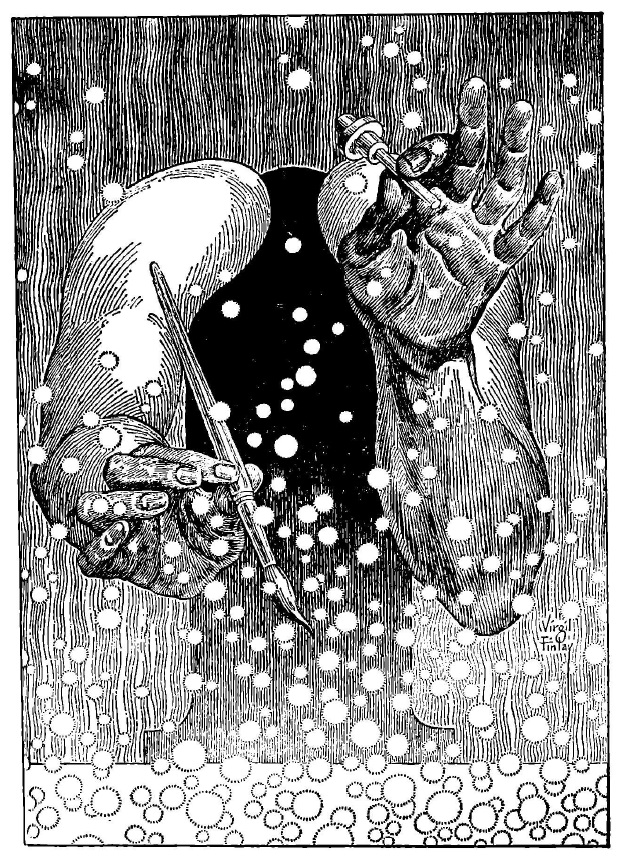



![[November 9, 1964] Shall We Gather At The River? (January 1965 <i>Worlds of Tomorrow</i>)](https://galacticjourney.org/wp-content/uploads/2019/11/Worlds_Of_Tomorrow_v02n05_1965-01_Gorgon776_0001-3-672x319.jpg)















